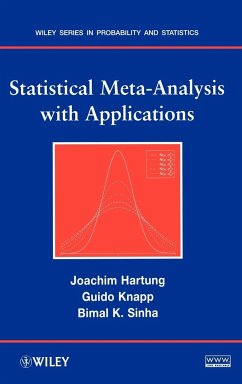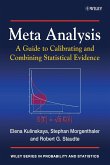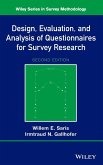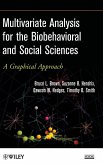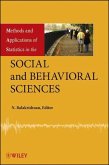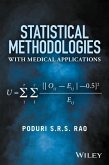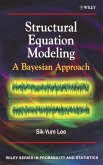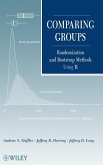- Gebundenes Buch
- Merkliste
- Auf die Merkliste
- Bewerten Bewerten
- Teilen
- Produkt teilen
- Produkterinnerung
- Produkterinnerung
Mehr als zehnjährige Erfahrung in der Verbesserung von Methoden zur Meta-Analyse fließen in dieses Werk ein, wobei vollkommen neue Aspekte und Möglichkeiten zur Verbindung einzelner Verfahren aufgezeigt werden. Auch die elektronischen Verarbeitungsmöglichkeiten von Daten hierzu wird besprochen.
Andere Kunden interessierten sich auch für
![Meta Analysis Meta Analysis]() Elena KulinskayaMeta Analysis86,99 €
Elena KulinskayaMeta Analysis86,99 €![Design of Questionnaires 2E Design of Questionnaires 2E]() Willem E. SarisDesign of Questionnaires 2E102,99 €
Willem E. SarisDesign of Questionnaires 2E102,99 €![Multivariate Analysis Social S Multivariate Analysis Social S]() Bruce L BrownMultivariate Analysis Social S136,99 €
Bruce L BrownMultivariate Analysis Social S136,99 €![Methods and Applications of Statistics in the Social and Behavioral Sciences Methods and Applications of Statistics in the Social and Behavioral Sciences]() Methods and Applications of Statistics in the Social and Behavioral Sciences247,99 €
Methods and Applications of Statistics in the Social and Behavioral Sciences247,99 €![Statistical Methodologies with Medical Applications Statistical Methodologies with Medical Applications]() Poduri S. R. S. RaoStatistical Methodologies with Medical Applications118,99 €
Poduri S. R. S. RaoStatistical Methodologies with Medical Applications118,99 €![Structural Equation Modeling Structural Equation Modeling]() Sik-Yum LeeStructural Equation Modeling170,99 €
Sik-Yum LeeStructural Equation Modeling170,99 €![Comparing Groups Comparing Groups]() Andrew ZiefflerComparing Groups112,99 €
Andrew ZiefflerComparing Groups112,99 €-
-
-
Mehr als zehnjährige Erfahrung in der Verbesserung von Methoden zur Meta-Analyse fließen in dieses Werk ein, wobei vollkommen neue Aspekte und Möglichkeiten zur Verbindung einzelner Verfahren aufgezeigt werden. Auch die elektronischen Verarbeitungsmöglichkeiten von Daten hierzu wird besprochen.
Hinweis: Dieser Artikel kann nur an eine deutsche Lieferadresse ausgeliefert werden.
Hinweis: Dieser Artikel kann nur an eine deutsche Lieferadresse ausgeliefert werden.
Produktdetails
- Produktdetails
- Wiley Series in Probability and Statistics
- Verlag: Wiley & Sons
- 1. Auflage
- Seitenzahl: 272
- Erscheinungstermin: 1. August 2008
- Englisch
- Abmessung: 240mm x 161mm x 19mm
- Gewicht: 525g
- ISBN-13: 9780470290897
- ISBN-10: 0470290897
- Artikelnr.: 23559067
- Herstellerkennzeichnung
- Libri GmbH
- Europaallee 1
- 36244 Bad Hersfeld
- gpsr@libri.de
- Wiley Series in Probability and Statistics
- Verlag: Wiley & Sons
- 1. Auflage
- Seitenzahl: 272
- Erscheinungstermin: 1. August 2008
- Englisch
- Abmessung: 240mm x 161mm x 19mm
- Gewicht: 525g
- ISBN-13: 9780470290897
- ISBN-10: 0470290897
- Artikelnr.: 23559067
- Herstellerkennzeichnung
- Libri GmbH
- Europaallee 1
- 36244 Bad Hersfeld
- gpsr@libri.de
JOACHIM HARTUNG, PhD, is Professor in the Department of Statistics at the Dortmund University of Technology, Germany. He has published several books and two dozen journal articles in the field of statistics. GUIDO KNAPP, PhD, is Assistant Professor in the Department of Statistics at the Dortmund University of Technology, Germany. Dr. Knapp's areas of research interest include variance component models, error components regression models, meta-analysis, and flexible design in clinical trials. BIMAL K. SINHA, PhD, is Presidential Research Professor of Statistics in the Department of Mathematics and Statistics at the University of Maryland at Baltimore County (UMBC). A Fellow of both the Institute of Mathematical Statistics and the American Statistical Association, Dr. Sinha's research specializes in the areas of multivariate analysis, mixed linear models, decision theory, robustness, and environmental statistics.
Preface.
1. Introduction.
2. Various Measures of Effect Size.
2.1 Effect Size based on Means.
2.2 Effect Size based on Proportions.
2.3 Effect Size based on - Coefficient and Odds Ratio.
2.4 Effect Size based on Correlation.
3. Combining Independent Tests.
3.1 Introduction.
3.2 Description of Combined Tests.
4. Methods of Combining Effect Sizes.
5. Inference about a Common Mean of Several Univariate Normal Populations.
5.1 Results on Common Mean Estimation.
5.2 Asymptotic Comparison of Some Estimates of Common Mean for k = 2
Populations.
5.3 Confidence Intervals for the Common Mean.
5.4 Applications.
5.5 Appendix: Theory of Fisher's Method.
6. Tests of Homogeneity in Meta-Analysis.
6.1 Model and Test Statistics.
6.2 An Exact Test of Homogeneity.
6.3 Applications.
7. One-Way Random Effects Model.
7.1 Introduction.
7.2 Homogeneous Error Variances.
7.3 Heterogeneous Error Variances.
8. Combining Controlled Trials with Normal Outcomes.
8.1 Difference of Means.
8.2 Standardized Difference of Means.
8.3 Ratio of Means.
9. Combining Controlled Trials with Discrete Outcomes.
9.1 Binary Data.
9.2 Ordinal Data.
10. Meta-Regression.
10.1 Model with One Covariate.
10.2 Model with More Than One Covariate.
10.3 Further Extensions and Applications.
11. Multivariate Meta-Analysis.
11.1 Combining Multiple Dependent Variables from a Single Study.
11.2 Modeling Multivariate Effect Sizes.
12. Bayesian Meta-Analysis.
12.1 A General Bayesian Model for Meta-Analysis under Normality.
12.2 Further Examples of Bayesian Analyses.
12.3 A Unified Bayesian Approach to Meta-Analysis.
12.4 Further Results on Bayesian Meta-Analysis.
13. Publication Bias.
14. Recovery of Inter-Block Information.
14.1 Notations and Test Statistics.
14.2 BIBD with Fixed Treatment Effects.
15. Combination of Polls.
15.1 Formulation of the Problem.
15.2 Meta-Analysis of Polls.
16. Vote Counting Procedures.
17. Computational Aspects.
17.1 Extracting Summary Statistics.
17.2 Combining Tests.
17.3 Generalized P-values.
17.4 Combining Effect Sizes.
18. Data Sets.
18.1 Validity Studies.
18.2 Effects of Teacher Expectance on Pupil IQ.
18.3 Dentifrice Data.
18.4 Effectiveness of Amlodipine on Work Capacity.
18.5 Effectiveness of Cisapride on the Treatment of Nonulcer Dyspepsia.
18.6 Secondhand Smoking.
18.7 Effectiveness of Misoprostol in Preventing Gastrointestinal Damage.
18.8 Prevention of Tuberculosis.
References.
Index.
1. Introduction.
2. Various Measures of Effect Size.
2.1 Effect Size based on Means.
2.2 Effect Size based on Proportions.
2.3 Effect Size based on - Coefficient and Odds Ratio.
2.4 Effect Size based on Correlation.
3. Combining Independent Tests.
3.1 Introduction.
3.2 Description of Combined Tests.
4. Methods of Combining Effect Sizes.
5. Inference about a Common Mean of Several Univariate Normal Populations.
5.1 Results on Common Mean Estimation.
5.2 Asymptotic Comparison of Some Estimates of Common Mean for k = 2
Populations.
5.3 Confidence Intervals for the Common Mean.
5.4 Applications.
5.5 Appendix: Theory of Fisher's Method.
6. Tests of Homogeneity in Meta-Analysis.
6.1 Model and Test Statistics.
6.2 An Exact Test of Homogeneity.
6.3 Applications.
7. One-Way Random Effects Model.
7.1 Introduction.
7.2 Homogeneous Error Variances.
7.3 Heterogeneous Error Variances.
8. Combining Controlled Trials with Normal Outcomes.
8.1 Difference of Means.
8.2 Standardized Difference of Means.
8.3 Ratio of Means.
9. Combining Controlled Trials with Discrete Outcomes.
9.1 Binary Data.
9.2 Ordinal Data.
10. Meta-Regression.
10.1 Model with One Covariate.
10.2 Model with More Than One Covariate.
10.3 Further Extensions and Applications.
11. Multivariate Meta-Analysis.
11.1 Combining Multiple Dependent Variables from a Single Study.
11.2 Modeling Multivariate Effect Sizes.
12. Bayesian Meta-Analysis.
12.1 A General Bayesian Model for Meta-Analysis under Normality.
12.2 Further Examples of Bayesian Analyses.
12.3 A Unified Bayesian Approach to Meta-Analysis.
12.4 Further Results on Bayesian Meta-Analysis.
13. Publication Bias.
14. Recovery of Inter-Block Information.
14.1 Notations and Test Statistics.
14.2 BIBD with Fixed Treatment Effects.
15. Combination of Polls.
15.1 Formulation of the Problem.
15.2 Meta-Analysis of Polls.
16. Vote Counting Procedures.
17. Computational Aspects.
17.1 Extracting Summary Statistics.
17.2 Combining Tests.
17.3 Generalized P-values.
17.4 Combining Effect Sizes.
18. Data Sets.
18.1 Validity Studies.
18.2 Effects of Teacher Expectance on Pupil IQ.
18.3 Dentifrice Data.
18.4 Effectiveness of Amlodipine on Work Capacity.
18.5 Effectiveness of Cisapride on the Treatment of Nonulcer Dyspepsia.
18.6 Secondhand Smoking.
18.7 Effectiveness of Misoprostol in Preventing Gastrointestinal Damage.
18.8 Prevention of Tuberculosis.
References.
Index.
Preface.
1. Introduction.
2. Various Measures of Effect Size.
2.1 Effect Size based on Means.
2.2 Effect Size based on Proportions.
2.3 Effect Size based on - Coefficient and Odds Ratio.
2.4 Effect Size based on Correlation.
3. Combining Independent Tests.
3.1 Introduction.
3.2 Description of Combined Tests.
4. Methods of Combining Effect Sizes.
5. Inference about a Common Mean of Several Univariate Normal Populations.
5.1 Results on Common Mean Estimation.
5.2 Asymptotic Comparison of Some Estimates of Common Mean for k = 2
Populations.
5.3 Confidence Intervals for the Common Mean.
5.4 Applications.
5.5 Appendix: Theory of Fisher's Method.
6. Tests of Homogeneity in Meta-Analysis.
6.1 Model and Test Statistics.
6.2 An Exact Test of Homogeneity.
6.3 Applications.
7. One-Way Random Effects Model.
7.1 Introduction.
7.2 Homogeneous Error Variances.
7.3 Heterogeneous Error Variances.
8. Combining Controlled Trials with Normal Outcomes.
8.1 Difference of Means.
8.2 Standardized Difference of Means.
8.3 Ratio of Means.
9. Combining Controlled Trials with Discrete Outcomes.
9.1 Binary Data.
9.2 Ordinal Data.
10. Meta-Regression.
10.1 Model with One Covariate.
10.2 Model with More Than One Covariate.
10.3 Further Extensions and Applications.
11. Multivariate Meta-Analysis.
11.1 Combining Multiple Dependent Variables from a Single Study.
11.2 Modeling Multivariate Effect Sizes.
12. Bayesian Meta-Analysis.
12.1 A General Bayesian Model for Meta-Analysis under Normality.
12.2 Further Examples of Bayesian Analyses.
12.3 A Unified Bayesian Approach to Meta-Analysis.
12.4 Further Results on Bayesian Meta-Analysis.
13. Publication Bias.
14. Recovery of Inter-Block Information.
14.1 Notations and Test Statistics.
14.2 BIBD with Fixed Treatment Effects.
15. Combination of Polls.
15.1 Formulation of the Problem.
15.2 Meta-Analysis of Polls.
16. Vote Counting Procedures.
17. Computational Aspects.
17.1 Extracting Summary Statistics.
17.2 Combining Tests.
17.3 Generalized P-values.
17.4 Combining Effect Sizes.
18. Data Sets.
18.1 Validity Studies.
18.2 Effects of Teacher Expectance on Pupil IQ.
18.3 Dentifrice Data.
18.4 Effectiveness of Amlodipine on Work Capacity.
18.5 Effectiveness of Cisapride on the Treatment of Nonulcer Dyspepsia.
18.6 Secondhand Smoking.
18.7 Effectiveness of Misoprostol in Preventing Gastrointestinal Damage.
18.8 Prevention of Tuberculosis.
References.
Index.
1. Introduction.
2. Various Measures of Effect Size.
2.1 Effect Size based on Means.
2.2 Effect Size based on Proportions.
2.3 Effect Size based on - Coefficient and Odds Ratio.
2.4 Effect Size based on Correlation.
3. Combining Independent Tests.
3.1 Introduction.
3.2 Description of Combined Tests.
4. Methods of Combining Effect Sizes.
5. Inference about a Common Mean of Several Univariate Normal Populations.
5.1 Results on Common Mean Estimation.
5.2 Asymptotic Comparison of Some Estimates of Common Mean for k = 2
Populations.
5.3 Confidence Intervals for the Common Mean.
5.4 Applications.
5.5 Appendix: Theory of Fisher's Method.
6. Tests of Homogeneity in Meta-Analysis.
6.1 Model and Test Statistics.
6.2 An Exact Test of Homogeneity.
6.3 Applications.
7. One-Way Random Effects Model.
7.1 Introduction.
7.2 Homogeneous Error Variances.
7.3 Heterogeneous Error Variances.
8. Combining Controlled Trials with Normal Outcomes.
8.1 Difference of Means.
8.2 Standardized Difference of Means.
8.3 Ratio of Means.
9. Combining Controlled Trials with Discrete Outcomes.
9.1 Binary Data.
9.2 Ordinal Data.
10. Meta-Regression.
10.1 Model with One Covariate.
10.2 Model with More Than One Covariate.
10.3 Further Extensions and Applications.
11. Multivariate Meta-Analysis.
11.1 Combining Multiple Dependent Variables from a Single Study.
11.2 Modeling Multivariate Effect Sizes.
12. Bayesian Meta-Analysis.
12.1 A General Bayesian Model for Meta-Analysis under Normality.
12.2 Further Examples of Bayesian Analyses.
12.3 A Unified Bayesian Approach to Meta-Analysis.
12.4 Further Results on Bayesian Meta-Analysis.
13. Publication Bias.
14. Recovery of Inter-Block Information.
14.1 Notations and Test Statistics.
14.2 BIBD with Fixed Treatment Effects.
15. Combination of Polls.
15.1 Formulation of the Problem.
15.2 Meta-Analysis of Polls.
16. Vote Counting Procedures.
17. Computational Aspects.
17.1 Extracting Summary Statistics.
17.2 Combining Tests.
17.3 Generalized P-values.
17.4 Combining Effect Sizes.
18. Data Sets.
18.1 Validity Studies.
18.2 Effects of Teacher Expectance on Pupil IQ.
18.3 Dentifrice Data.
18.4 Effectiveness of Amlodipine on Work Capacity.
18.5 Effectiveness of Cisapride on the Treatment of Nonulcer Dyspepsia.
18.6 Secondhand Smoking.
18.7 Effectiveness of Misoprostol in Preventing Gastrointestinal Damage.
18.8 Prevention of Tuberculosis.
References.
Index.

